Swami Vivekananda’s Ideas and the Politics of Our Times
(Continued from the previous issue. . .)
3. Politics of Harmony
Even in the twenty-first century, Indian society seems to be deeply divided on caste and communal lines. As per the ‘Annual Crime Report 2013’ published by the Ministry of Home Affairs, Government of India, communal riots scored the highest (2.7%) among all types of violent crimes reported in 2013, and the incidents of communal riots increased by 25% in 2013 compared to the previous year. The report21 also stated that people belonging to the Scheduled Caste and Scheduled Tribe communities were the victims of more than 26% of total crimes reported in 2013.Unfortunately, the divisive politics of ‘vote-bank’ is considered as a major reason behind the escalation of such tensions in our society.
But Swamiji had never encouraged such divisive elements in society. Apparently, on some occasions, he had appreciated the positive role of the caste system in Indian society, so far as it had helped maintaining social order amidst diversity. However, in ultimate analysis, he unequivocally condemned the inhuman aspects of a rigidly stratified caste system. As he wrote in a letter:
‘The conviction is daily gaining on my mind that the idea of caste is the greatest dividing factor and the root of Maya [illusion]; all caste either on the principle of birth or of merit is bondage.’22 In fact, he sought to end all sorts of privileges claimed by any social group over others. Here, he wanted to apply the Vedantic principle of oneness. As he said:
If you teach Vedanta to the fisherman, he will say, I am as good a man as you; I am a fisherman, you are a philosopher, but I have the same God in me as you have in you. And that is what we want, no privilege for any one, equal chances for all; let everyone be taught that the divine is within, and every one will work out his own salvation.23
On the other hand, Swamiji dreamt of a harmonious Indian society consisting of the ‘Vedanta brain and Islam body’. In a letter to Mohammed Sarfaraz Husain he wrote:
We want to lead mankind to the place where there is neither the Vedas, nor the Bible, nor the Koran; yet this has to be done by harmonising the Vedas, the Bible and the Koran. Mankind ought to be taught that religions are but the varied expressions of THE RELIGION, which is Oneness, so that each may choose that path that suits him best.24
Underscoring his faith on harmonious growth of humanity, in a letter to E.T. Sturdy in 1895, Vivekananda wrote:
There is but one basis of well-being, social, political or spiritual—to know that I and my brother are one. This is true for all countries and all people.25
This ideal of oneness is becoming an increasingly essential but elusive motto for a globalised social order in India, and beyond. Vivekananda’s ideas in this regard may provide us an effective way out to resolve this paradox.
4. Politics for Comprehensive Development
Development has been a contentious issue. Vivekananda considered that material progress should not be the only or even the primary yardstick for measuring the advancement of a society. Rather, it should be measured by the capacity of the members of a society to develop themselves morally. So, ideally, all development initiatives in a society should be conducive to the manifestation of that capacity in its people. In his words:
The more advanced a society or nation is in spirituality, the more is that society or nation civilised. No nation can be said to have become civilised only because it has succeeded in increasing the comforts of material life by bringing into use lots of machinery and things of that sort. The present-day civilisation of the West is multiplying day by day only the wants and distresses of men. On the other hand, the ancient Indian civilisation, by showing people the way to spiritual advancement, doubtless succeeded, if not in removing once for all, at least in lessening, in a great measure, the material needs of men. . . . In this age, as on the one hand people have to be intensely practical, so on the other hand they have to acquire deep spiritual knowledge.26
There are certain striking resemblances between Vivekananda’s ideas and the recent trends in the development discourse. The most important of them is viewing development from the perspective of freedom. Emphasising the importance of freedom Swamiji wrote in a letter in 1899:
Freedom in all matters, i.e. advance towards Mukti [i.e. liberation] is the worthiest gain of man. To advance oneself towards freedom— physical, mental, and spiritual—and help others to do so, is the supreme prize of man. Those social rules which stand in the way of the unfoldment of this freedom are injurious, and steps should be taken to destroy them speedily. Those institutions should be encouraged by which men advance in the path of freedom.27
To achieve this at the social level ensuring liberty to everyone was essential; as Vivekananda considered liberty as the ‘first condition of growth’.28 And in defining liberty he wrote:
Liberty does not certainly mean the absence of obstacles in the path of misappropriation of wealth etc. by you and me, but it is our natural right to be allowed to use our own body, intelligence, or wealth according to our will, without doing any harm to others; and all the members of a society ought to have the same opportunity for obtaining wealth, education, or knowledge.29
In a similar fashion, Amartya Sen wrote in his Development As Freedom (2000):
Development can be seen . . . as a process of expanding the real freedoms that people enjoy . . . Development requires the removal of major sources unfreedom: poverty as well as tyranny, poor economic opportunities as well as systematic social deprivation, neglect of public facilities as well as intolerance or over-activity of repressive states. Despite unprecedented increases in opulence, the contemporary world denies elementary freedoms to vast numbers— perhaps even the majority—of people.30
Professor Sen contrasted this vision of development with ‘narrower views of development, such as identifying development with the growth of gross national product, or with technological advance, or with social modernisation.’31 Since 1990s these ‘alternative’ ideas of development have been institutionalised through some of the major development initiatives undertaken by the United Nations Organisation, like the United Nations Development Programme (UNDP), the World Summit for Social Development (1995) and the Millennium Development Goals (2000). Vivekananda was not a social scientist by training. His perspectives on development evolved around his primary concern for the all-round development of man, which he termed as the ‘man-making mission’. Interestingly, in a similar vein, defining the concept of ‘Human Development’, the first Human Development Report (HDR) stated:
People are the real wealth of a nation. The basic objective of development is to create an enabling environment for people to enjoy long, healthy and creative lives. . . Human development is a process of enlarging people’s choices. The most critical ones are to lead a long and healthy life, to be educated and to enjoy a decent standard of living. Additional choices include political freedom, guaranteed human rights and selfrespect. . . The simple truth is that there is no automatic link between income growth and human progress. The main preoccupation of development analysis should be how such a link can be created and reinforced.32
5. Politics of Mass Awakening
The idea of mass empowerment remains a major concern of politics for many years. Vivekananda believed that the progress of a nation depended not merely on the condition of its elites but actually on the condition of its masses. In an interview in 1897, he said:
I consider that the great national sin is the neglect of the masses, and that is one of the causes of our downfall. No amount of politics would be of any avail until the masses in India are once more well educated, well fed, and well cared for. They pay for our education, they build our temples, but in return they get kicks. They are practically our slaves. If we want to regenerate India, we must work for them.33
Swamiji considered that human civilisation was necessarily a product of collective social efforts and no single person or class can claim the sole credit of it. In his Bengali article Modern India (Bartaman Bharat), Swamiji asserted that the individual’s existence and interests were by nature dependent on the collective order. To deny that or to go against that was self-destructive, according to him.34
Based on this line of argument, he concluded that for building a ‘just’ society all sections of the population should have a say over the decision-making process and due rights on the social resources, without discrimination. In his words:
Unless the blood circulates over the whole body, has any country risen at any time? If one limb is paralysed, then even with the other limbs whole, not much can be done with that body . . .35
Vivekananda termed this process of mass awakening as ‘Shudra-jagaran’. Welcoming the advent of a new era of people’s power he wrote:
Let New India arise . . . Let her arise —out of the peasants’ cottage, grasping the plough; out of the huts of the fisherman, the cobbler, and the sweeper. Let her spring from the grocer’s shop, from beside the oven of the fritter-seller. Let her emanate from the factory, from marts, and from markets. Let her emerge from groves and forests, from hills and mountains.36
Analysing the nature of popular sovereignty in developing societies like India, in a recent work, Partha Chatterjee (2009), has identified a new category of people called the ‘political society’ with immense political clout. In his view:
Civil society restricted to a small section of culturally equipped citizens, represents in countries like India the high ground of modernity. So does the constitutional model of state. But in actual practice, governmental agencies must descend from that high ground to the terrain of political society in order to renew their legitimacy as providers of well-being and there to confront whatever is the current configuration of politically mobilised demands.37
For him, ‘political society’ is now one of the key determinants in any process of sociopolitical transformation as it was the ‘civil society’ during the nineteenth century. And there he finds ‘a constantly shifting compromise between the normative values of modernity and the moral assertion of popular demands.’38 A reflection of this ‘assertion’ may be traced in the recent popular protests across India against corruption in public life and violence on women. The popular uprisings in the Middle East called the ‘Arab Spring’ or the ‘Occupy Central with Love and Peace’ movement for democratic rights in Hong Kong may also be cited as instances of such mass awakening. In spite of many limitations, these popular protests reveal the inadequacies of the prevailing political set-ups to deliver justice. They also signify the might of the people’s power and the innovative ways to express it. Here again, Vivekananda’s idea of mass awakening has much to contribute in understanding these recent trends in politics of our times.
Conclusion
One may argue that Swamiji’s ideas sound good, but they are impractical. The general perception about politics is so negative today, that it seems hard to find anything positive in it. But in the twentieth century we have had legendary political personalities like Mohandas Gandhi (1869-1947), Martin Luther King (1929-1968) and Nelson Mandela (1918- 2013); and if we look carefully into the politics of our times we will also find people like Anna Hazare (1937-), Aung San Suu Kyi (1945-) and Irom Chanu Sharmila (1971-), who, besides their specific political objectives, exemplify the politics of conscience, commitment, harmony, people’s power and comprehensive development. These political leaders and activists may or may not have been personally influenced by Swami Vivekananda; but the way they perceived and practised politics is indeed an endorsement of Swamiji’s idea of politics—an idea that motivates us to have a much needed positive perspective of politics.
Thus the same ideas of Swami Vivekananda that had inspired the different strands of the nationalist movement in India a century back, have come up with new implications for a globalised political scenario. (Concluded)
Notes and References
- See: National Crime Records Bureau, 19.11.14, (http:/ /mha.nic.in/), accessed on 28.11.14
- CWSV, Letter to Pramada Das Mitra from Almora (original in Bengali dated 30 May, 1897), Vol 6, pp 394
- Ibid, ‘Vedanta in its Application to Indian Life’ (lecture delivered in Madras on 13 February, 1897), Vol 3, pp 245-46
- Ibid, Letter to Mohammed Sarfaraz Husain from Almora (dated 10 June, 1898), Vol 6, p 416
- Ibid, Letter to E. T. Sturdy from New York (dated 9 August, 1895), Vol 8, p 350
- Ibid, ‘From the Diary of a Disciple’ (original in Bengali, 1897), Vol 6, pp 462-63
- Ibid, Letter to Mrinalini Bose from Deoghar (original in Bengali dated 3 January, 1899), Vol 5, p 147
- Ibid, Letter to Alasinga Perumal from USA (dated 29 September, 1894), Vol 5, p 47
- Ibid, Letter to Mrinalini Bose from Deoghar (original in Bengali dated 3 January, 1899), Vol 5, p 146
- Sen, Amartya, 2000, Development As Freedom, New Delhi: Oxford University Press, pp 3-4
- Ibid, p 3
- See: UNDP: ‘Defining and measuring human development’, Human Development Report 1990, New York & Oxford: Oxford University Press, Ch 1, pp 9-10 (http://hdr.undp.org/ sites/default/ files/reports/219/hdr_1990_en_complete_ nostats.pdf), last viewed on 17.06.2014
- CWSV, ‘The Missionary Work of the First Hindu Sannyasin to the West and His Plan of Regeneration of India’ (interview with the Madras Times, February, 1897), Vol 5, pp 222-23
- He wrote: ‘The individual’s life is in the life of the whole, the individual’s happiness is in the happiness of the whole; apart from the whole, the individual’s existence is inconceivable—this is an eternal truth and is the bed-rock on which the universe is built. Wisdom, knowledge, wealth, men, strength, prowess, and whatever else nature gathers and provides us with, are all only for diffusion, when the moment of need is at hand. We often forget this fact, put the stamp of “mine only” upon the entrusted deposits, and pari passu, we sow the seed of our own ruin!’–Ibid, ‘Modern India’ (original in Bengali–Bartaman Bharat, 1899), Vol 4, pp 463-64
- Ibid, ‘From the Diary of a Disciple’, (original in Bengali, 1902), Vol 7, p 246
- Ibid, Vol 7, pp 327-28
- Chatterjee, Partha, 2009, The Politics of the Governed Reflections on Popular Politics in Most of the World, New Delhi: Permanent Black, p 41
- Ibid, p 41
Source : Vedanta Kesari, March, 2015

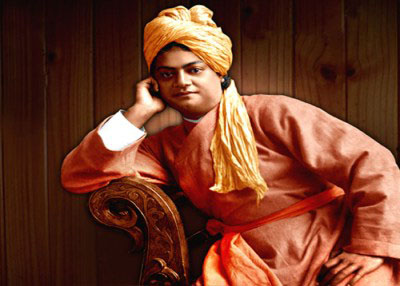
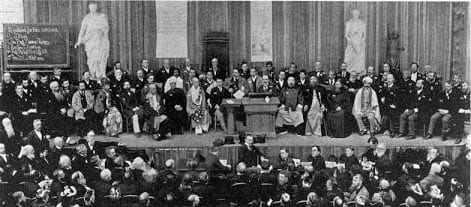
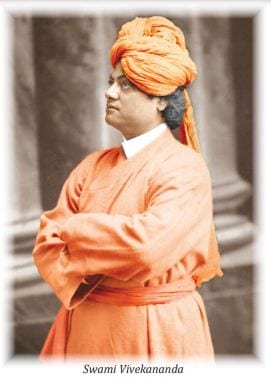
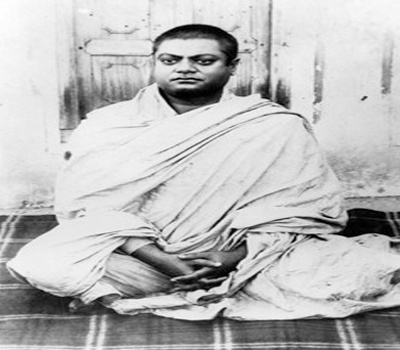

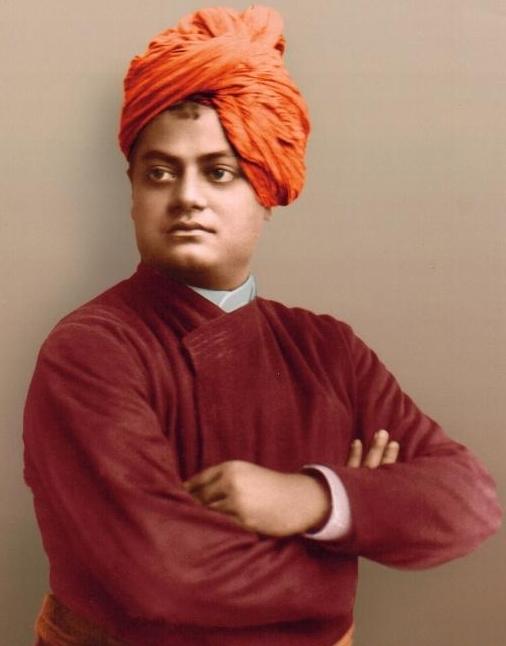
Leave A Comment